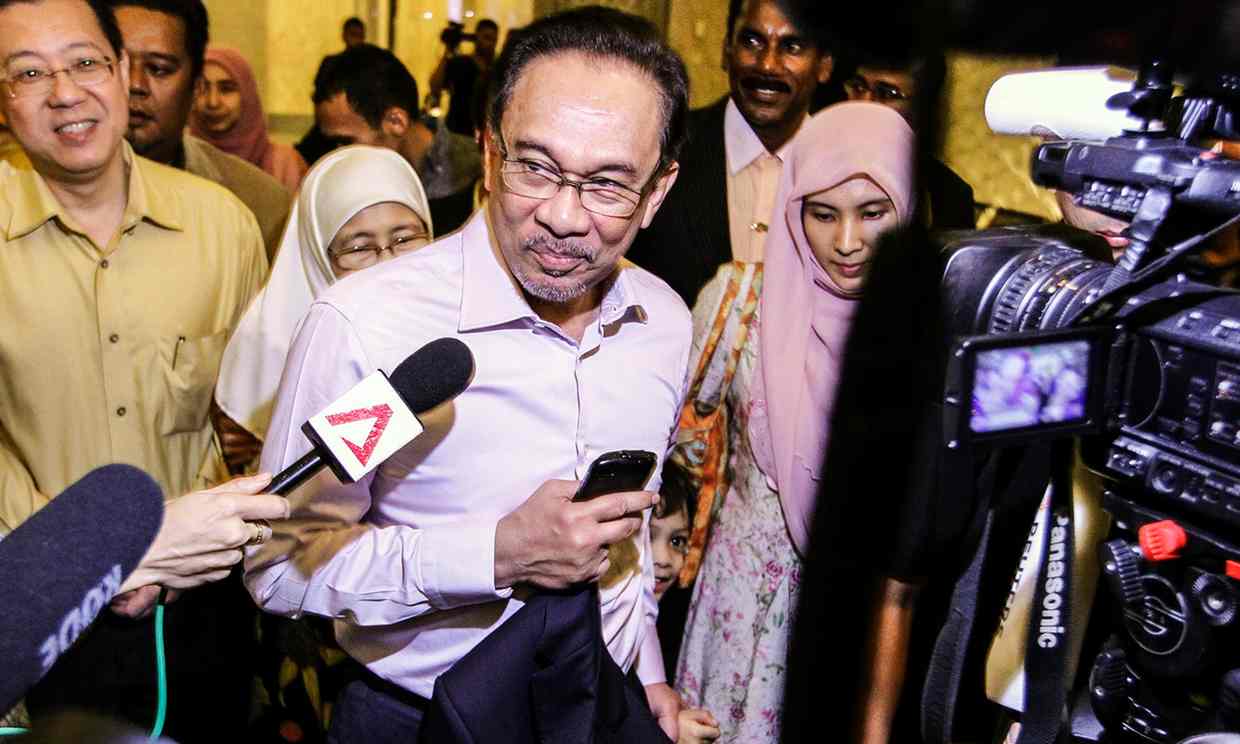Earlier this week the UK’s Guardian newspaper published a full length essay by Malaysia’s imprisoned opposition leader, Anwar Ibrahim, on the eve of the ruling against his application for a Judicial Review against his sentence.
He presented his hope for a future Malaysia as a moderate, democratic, muslim nation, the same vision which had been the bedrock of his manifesto at the last election and when he convincingly won the popular vote.
Malaysia needs democracy. I’m in prison for that belief – but I won’t change it
Winston Churchill once famously paraphrased: “Democracy is the worst form of government except for all the others.” Recent anti-progressive electoral upsets in the US and UK, combined with potential successes looming for similar sentiment in upcoming European polls, are conspiring to give democracy a bad name in some circles.
Yet despite the challenges, we must be globally resolute in our commitment to accountable representative governments, with reinforcing systems of transparency and accountability.
In the Muslim world in particular, real democracy is essential to confront the threats to life, peace, security, freedom and human dignity that have become virtually epidemic from Africa to east Asia. Failure to address political grievances allows extremists the opportunity to pounce on the disenchanted and marginalised with their brand of deviant Islam.
Earlier this year my long-time friend, Rached Ghannouchi of Tunisia, challenged his Islamist peers by boldly pronouncing at the Ennahda party convention, “We are leaving political Islam … We are Muslim democrats.”
While this ideal may be still nascent in the Middle East, in south-east Asia, the success of Indonesia and the relative progress of Malaysia can make them beacons for Muslim-majority countries globally. But as my own political imprisonment exemplifies, we still need unyielding international encouragement and pressure, if our nations are to fully realise their democratic destinies.
Two decades ago Malaysia was arguably the bright spot of progress in the Muslim world. We believed then that our combination of economic growth and improving democratic engagement would be an example for other Muslim-majority countries. The past 20 years, however, have seen our country go from bad to worse politically and economically, driven by compromised democratic institutions and years of systematic abuse by the ruling elite to maintain their grip on power.
Our people have chosen the path of reform and democratic accountability as the way forward. This was evident when they showed tremendous courage in the 2013 general election and delivered a 52% majority for the opposition coalition I was honoured to lead.
Despite its uninterrupted rule since Malaysia’s independence, its ownership of over 95% of the nation’s media assets, and its control of the judiciary and federal police forces, the government dreads a democratic wave sweeping them from power. The historic scale of its kleptocracy has been highlighted internationally by the multibillion-dollar 1MDB scandal, now the subject of the largest corruption investigation in US department of justice history.
I remain optimistic for our nation and about the victory of our citizens, because the current opposition coalition now even includes former prime minister Mahathir Mohamad, and an increasing number of his allies defecting from UMNO. To stem a mass revolt, the ruling elite has resorted to desperate and repressive measures which have forced the country further into despotism. This includes the criminalising of public debate and a cynical exacerbation of racial and religious tensions. The latter factor has increased religious extremism to the point that per capita, Malaysia is sending six times the number of foreign fighters to join Islamic State as our neighbour Indonesia.
Seventeen years ago my colleagues and I took a defiant stance against autocracy: our “Reformasi” (reform) movement started with a dream of multi-ethnic politics grounded on the principles of reform, inclusivity and justice. Fast forward to today, and the movement has evolved into a formidable and vibrant opposition.
This has put Malaysia at a crossroads: it can either return to its rightful place as a shining political and financial star in a developing world desperate for such successes; or it can descend to the role of yet another Muslim-majority country with a failing democracy and economy. Internationally, support for fundamental political reforms in Malaysia can help create a south-east Asian bloc of Muslim governments that will be a model for the rest of the world.
What may be the final judicial review of my case will be held this week, and I hope my wrongful conviction will now be overturned. I pray my political imprisonment will soon end – as the United Nations, Amnesty International and Human Rights Watch have all implored – and that I may be free again to witness a new chapter in world history. I believe the factors are well-aligned to see Malaysia return to its position of regional leadership. if its true friends can work to ensure it does not slide down a path from which it will be difficult to quickly recover.
As the original convener of the World Forum for Muslim Democrats in 2014, I am certain that freedom, transparency, accountability are the right answers for Malaysia and for the entire Muslim world. Democracy may not be the perfect solution to every problem we have, but simply put, it is better than every other option.

